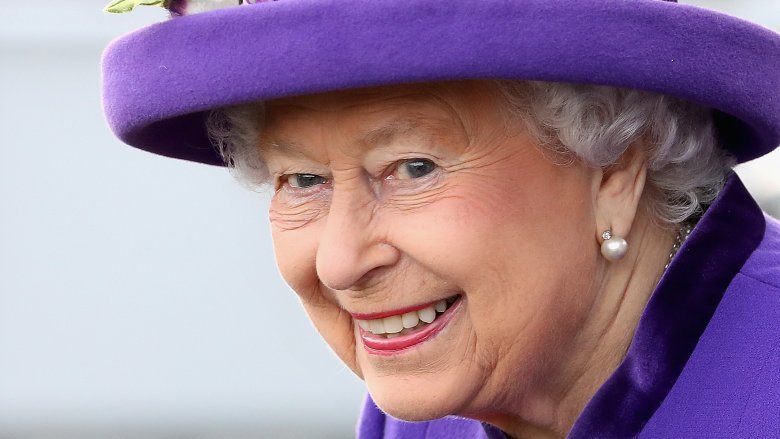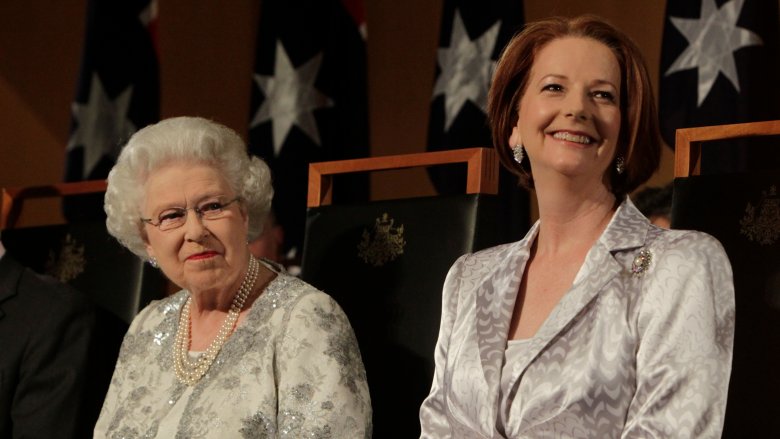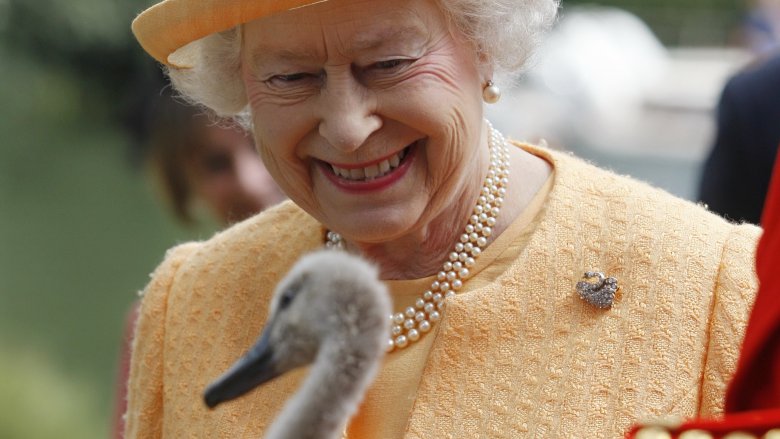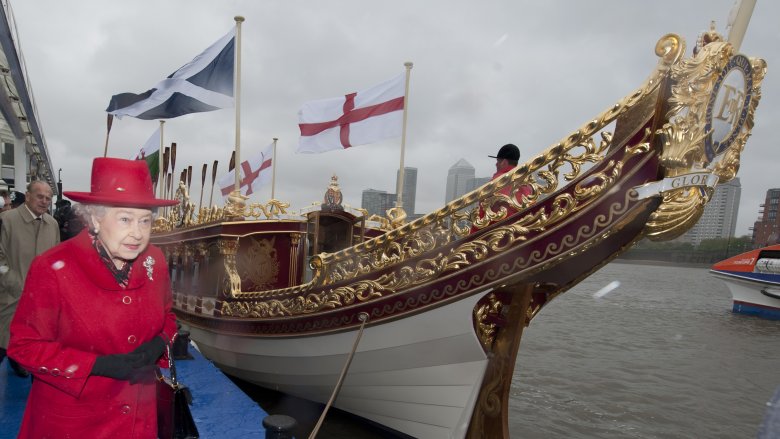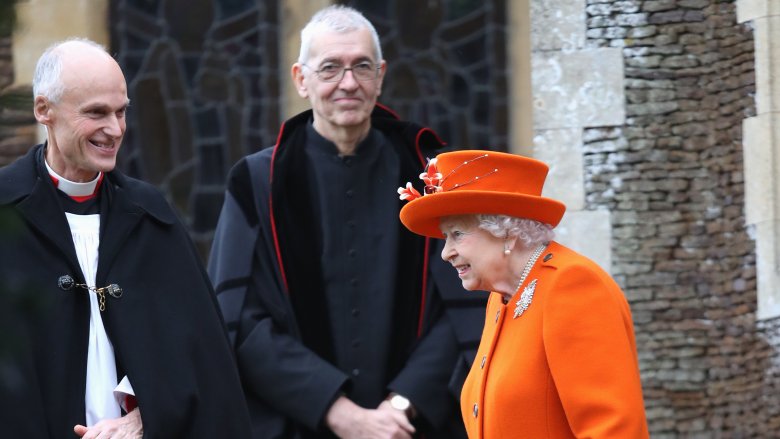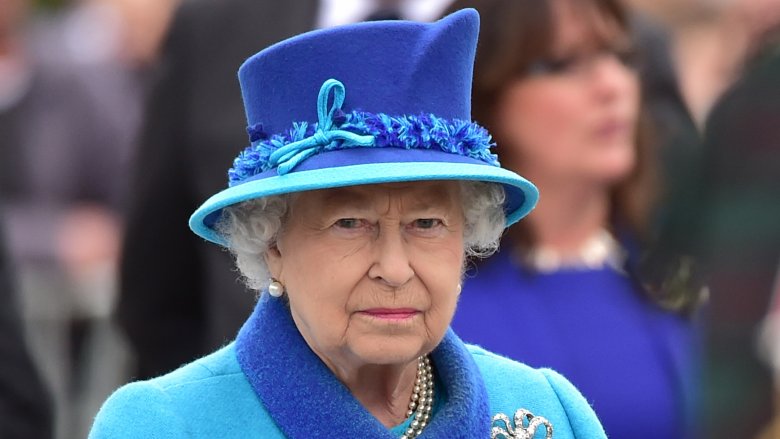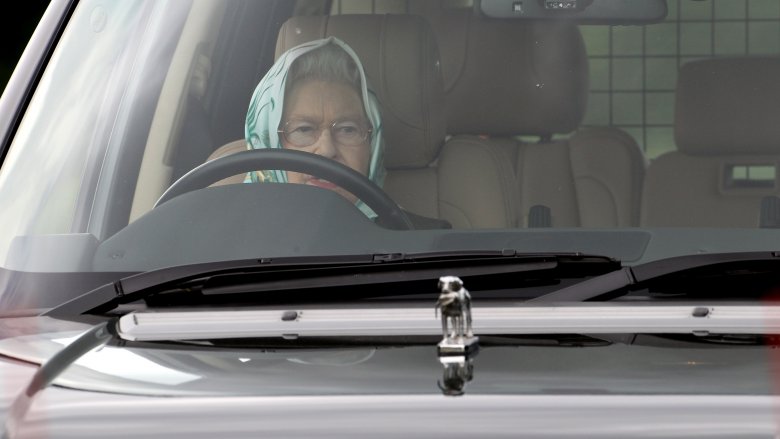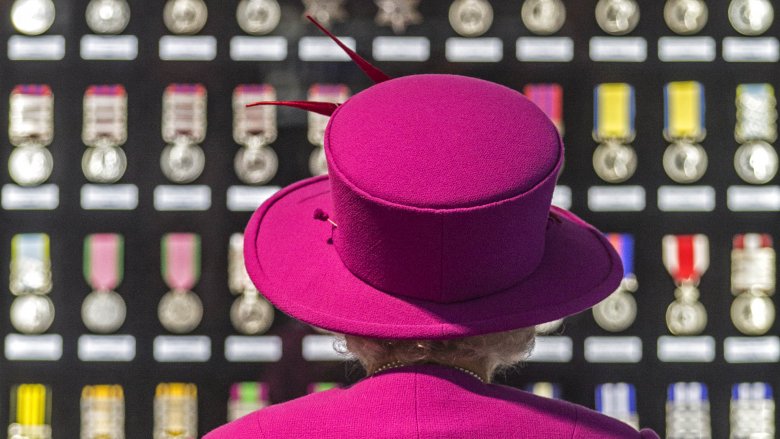Bizarre Powers The Royal Family Have Over People
There's a common misconception that the British royal family lacks any form of meaningful power in the modern era and that their position nowadays is largely ceremonial, and while this might be true in many aspects, it isn't 100 percent accurate. The sway that the royals hold over their subjects in Great Britain and the Commonwealth has undoubtedly diminished since William the Conqueror was crowned on Christmas Day in 1066, but in truth, Queen Elizabeth II and her family still hold a number of real powers today — and many of them are utterly strange. From controlling what the British are allowed to eat to their right to engage in modern piracy, these are the bizarre and unusual powers that the British royal family continue to hold over their people.
They can fire the whole Australian government
Australia as we know it today officially became a country in its own right in 1901 when the British allowed their six existing colonies to start governing themselves. For years the Brits used the land down under as an island prison, sending convicted criminals on the long voyage there instead of giving them the death penalty. According to the BBC, as many as 20 percent of Aussies are directly descended from convicts, many of whom committed crimes that would get them little more than a slap on the wrist today. Bigamy, for example, would have bought you a spot on one of the ships.
Despite the formation of a federation in Australia, Queen Victoria was still considered the head of state, and the same can be said of Queen Elizabeth II today. While this may seem ceremonial, what many people don't realize is that the British monarch (or, more accurately, their acting Governor General) actually has the power to fire the Australian Prime Minister if they see fit, and this is exactly what happened in 1975 when the Australian government shut down because the legislature failed to fund it. According to The Washington Post, every single member of the Australian parliament was told to clear out their desk, and there hasn't been another shutdown since. Looks like Her Majesty made her point.
They're the only ones allowed to eat swan
The history of swans in Great Britain is as fascinating as it is bizarre. According to Modern Farmer, the smell of roast swan often filled the courts of Henry VIII and Elizabeth I; sometimes the bird would be stuffed with a series of increasingly smaller birds for good measure. The elegant species has been officially recognized as the property of the monarchy in Britain since 1482 when Edward IV passed the unimaginatively named Act Concerning Swans, and to this day the royal family employs a Swan Master to count and keep track of numbers on the river Thames.
To hunt or even harm a swan is considered treason and could land one of Her Majesty's subjects in trouble with the law, yet the queen herself is still allowed to tuck into one whenever she fancies it. Roast swan hasn't been on the menu at Buckingham Palace for a number of years, however, as the modern royals remain dedicated to protecting them. In 2014, one man was lucky to escape with just a fine after he beheaded a swan in a park and shoved it in his backpack, getting off easy after he pleaded ignorance.
"I did not know what type of bird it was," Hasan Fidan, who was filmed decapitating the animal by a shocked onlooker, said (via Express). "For me it was any type of bird, I didn't know the Queen owned them." Fidan admitted to the crime in court, adding that his kill "tasted nice."
They own all the whales and dolphins, too
Fidan isn't the only person to have been paid a visit by the police after hunting one of the queen's animals. In 2004, fisherman Robert Davies found himself in hot water when he caught a sturgeon in Swansea Bay and attempted to sell it at auction. The trouble was — just like any whales and dolphins that happen to wander into British waters — the sturgeon is considered a 'royal fish' and must be offered to the queen if caught.
Davies was aware of this law when he discovered the 264-pound fish in his net, and when he contacted the royal estate to offer his catch to Her Majesty, he received a reply telling him to dispose of the nine-foot beast however he saw fit. He took that to mean that he could go ahead and sell the sturgeon (thought to be more than 100 years old when captured) at auction, though this was the one thing he wasn't legally allowed to do.
"The fish is now under police possession and we are seeing if any criminal offenses have been committed," a police spokesman told the BBC. In the end, no criminal charges were brought against Davies, and the sturgeon (a species which is very rarely found in British waters) was sent to the Natural History Museum in London.
The queen is the 'Supreme Governor' of the Church of England
The Church of England was founded in 1534 when the notoriously picky King Henry VIII failed to convince the Pope to grant him a divorce from his first bride Catherine of Aragon. Undeterred by Rome's snub, the stubborn monarch decided to leave the Catholic Church and create his own brand of Christianity, giving himself the power to divorce and remarry as he saw fit in the process — he had a total of six wives in his lifetime, beheading two of them after they failed to give him a son.
Despite his daughter Mary I's attempts to reinstate Catholicism in her realm (she burned countless Protestants at the stake during her reign, earning her the nickname Bloody Mary), Henry's church became the official religion of the royal family and it remains that way today. The current queen's full title is actually the 'Defender of the Faith and Supreme Governor of the Church of England,' and she retains the right to advise the Prime Minister on the appointment of deans, bishops, and even archbishops. She essentially controls Britain's 12,600 parishes.
A royal marrying outside of the faith was against the law in the U.K. for hundreds of years, though the rules were relaxed in 2015, which was good news for Prince Harry and his American wife Meghan Markle — the former Suits actress went to a private Catholic all-girls school in the States.
The queen is immune from prosecution
Let's imagine for a second that the queen was having a really bad day and decided to vent by going on a crime spree through the streets of London. That would give the police the right to arrest her and bring her in, right? Wrong. In Britain, the reigning monarch is the only person completely immune to prosecution, meaning she can do pretty much whatever the heck she likes without worrying about the repercussions. In such a scenario — however unlikely — it would be the queen's ministers who would end up in court facing prosecution, not Her Majesty herself.
According to The Guardian, this power was exercised as recently as 2007, when the inquest into the death of Diana finally started a decade after she was killed in a horrific car crash in Paris. There were rumors that the queen would be asked to give evidence in her own court after reportedly telling former butler Paul Burrell that the beloved princess could have been the victim of "powers at work in this country about which we have no knowledge," but it never happened. The last monarch to appear in court was Charles I, who had little choice in the matter — he was executed for high treason during the English Civil War.
The queen doesn't need a driver's license
In the U.K., every citizen is required to sit for a theoretical and practical driving exam before they're allowed to take a vehicle out on the road, for their own safety as well as the safety of others. Well, every citizen bar the queen, that is. The reigning monarch has the power to pull rank on the DVLA (Driver and Vehicle Licensing Agency) and go out driving without having an issued license, despite the obvious dangers that come with a senior citizen being behind the wheel on the capital's hectic streets.
Her Majesty has been spotted behind the wheel as recently as 2017, when photographers snapped the 91-year-old driving her Jaguar (a change from her preferred Range Rover) home from a church service. According to The Telegraph, the queen learned how to drive stick while serving as a mechanic in the Auxiliary Territorial Service, the women's branch of the British Army during the Second World War.
Similarly, the queen doesn't own a U.K. passport, as technically it's her who gives them out. "As a British passport is issued in the name of Her Majesty, it is unnecessary for the queen to possess one," the official website of the royal family explains. "All other members of the royal family, including the Duke of Edinburgh and the Prince of Wales, have passports." Elizabeth II has visited more countries than any other British monarch in history, yet she doesn't have a single stamp to show for it.
They can commandeer ships
What do the royal family and pirates have in common? That isn't the opening line of a joke, it's a serious question, and if you answered, "They both commandeer ships whenever they feel like it," give yourself a pat on the back. The royals have held this odd power for a long time and still hold it today, exercising it as recently as 1982 when one of the world's most luxurious ocean liners was called home and given to the British Navy, who needed it to transport troops to the Falklands. In fairness to the queen, the ship in question was named after her.
The ultra-posh Queen Elizabeth II (more commonly known as the QE2) sported seven fancy cocktail bars, four swimming pools, and a casino, but holidays were canceled after Argentinian troops invaded the British territory and laid claim to it. "Of course we greatly regret the inconvenience caused to intending passengers," The New York Times quoted a Defense Ministry spokesman as saying at the time. "But the QE2's speed, size and facilities make her uniquely suited to carry a substantial number of troops, who must be kept fit and ready for operations should they be required."
In the short but violent war that followed, 649 Argentines and 255 British troops lost their lives, with the South American country admitting defeat and surrendering after ten weeks of intense fighting. The historic ship was retired in 2008 and sold to the UAE government conglomerate Dubai World for around $90 million.
They can send Britain to war
The royals not only have the power to commandeer ships to give to the British armed forces, they actually have the power to command the armed forces themselves. Freedom of information requests have shown that the royal family have had the final say on numerous bills passing through parliament over the last few decades, with the queen and Prince Charles taking advantage of a little-known law that gives them the final say over issues affecting the Duchy of Lancaster and Duchy of Cornwall.
"These guidelines effectively mean the queen and Charles both have power over laws affecting their sources of private income," The Guardian wrote, but the queen's spokeswoman denied any wrongdoing from the palace. "It is a long established convention that the Queen is asked by parliament to provide consent to those bills which parliament has decided would affect crown interests," she said. "The sovereign has not refused to consent to any bill affecting crown interests."
This is at odds with the findings of John Kirkhope, the legal scholar who gained access to papers detailing the 39 bills secretly run by the royals in recent years. "There has been an implication that these prerogative powers are quaint and sweet but actually there is real influence and real power, albeit unaccountable," he said. The most shocking revelation of all was that the queen vetoed a bill that would have transferred the right to send Britain to war from the crown to parliament, keeping that power for herself.

